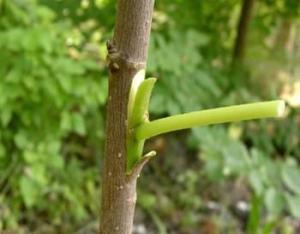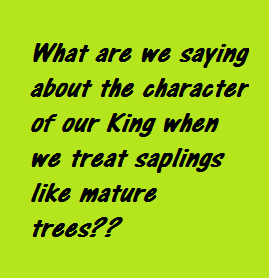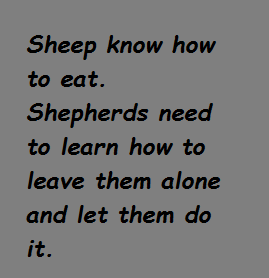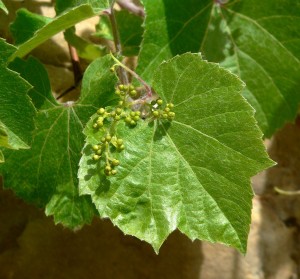The Character of God as Agriculturalist Pt 5: Why would anyone graft a wild branch on a cultivated tree?
In January, I published a note called The Trauma of Being Grafted In, For the Tree and the Branches and I have seen it reposted on different blogs so I figure I ought to post it here as well, but then I changed it and added to it.
I always preface a discussion of grafting with this, because I think it is important to establish who we are — no longer Gentiles but Israelites.
Ephesians 2:11 Wherefore remember, that ye being in time past Gentiles in the flesh, who are called Uncircumcision by that which is called the Circumcision in the flesh made by hands;
12 That at that time ye were without Christ, being aliens from the commonwealth of Israel, and strangers from the covenants of promise, having no hope, and without God in the world:
13 But now in Christ Jesus ye who sometimes were far off are made nigh by the blood of Christ.
14 For he is our peace, who hath made both one, and hath broken down the middle wall of partition between us;
15 Having abolished in his flesh the enmity, even the law of commandments contained in ordinances; for to make in himself of twain one new man, so making peace;
16 And that he might reconcile both unto God in one body by the cross, having slain the enmity thereby:
17 And came and preached peace to you which were afar off, and to them that were nigh.
18 For through him we both have access by one Spirit unto the Father.
19 Now therefore ye are no more strangers and foreigners, but fellow citizens with the saints, and of the household of God;
.
When we look at who we were and who we are called to be — we cannot overlook the realities of the grafting process. Paul used it as a picture of what happens for a reason.
.
Romans 11:17 And if some of the branches be broken off, and thou, being a wild olive tree, wert grafted in among them, and with them partakest of the root and fatness of the olive tree;
18 Boast not against the branches. But if thou boast, thou bearest not the root, but the root thee.
19 Thou wilt say then, The branches were broken off, that I might be grafted in.
20 Well; because of unbelief they were broken off, and thou standest by faith. Be not highminded, but fear:
21 For if God spared not the natural branches, take heed lest he also spare not thee.
22 Behold therefore the goodness and severity of God: on them which fell, severity; but toward thee, goodness, if thou continue in his goodness: otherwise thou also shalt be cut off.
23 And they also, if they abide not still in unbelief, shall be grafted in: for God is able to graft them in again.
24 For if thou wert cut out of the olive tree which is wild by nature, and wert grafted contrary to nature into a good olive tree: how much more shall these, which be the natural branches, be grafted into their own olive tree?
.
Now, I have heard people say that we are grafted into the vine, Yeshua (Jesus), but Paul says that we are grafted into the olive tree of Israel, spoken of by the prophet Jeremiah.
.
Jer 11:16 The Lord called thy name, A green olive tree, fair, and of goodly fruit: with the noise of a great tumult he hath kindled fire upon it, and the branches of it are broken.
.
Grafting takes a branch of an uncultivated (wild) tree that has some favorable qualities, cuts it off from the tree it is currently a part of, strips it of its leaves, and then cuts the host tree in order to incorporate the mutilated branch. It isn’t a pleasant thing. The grafted branch has to change, and the host has to support and nourish.
.
But here are some important facts about grafting — the host never changes. The cultivated tree stays exactly the same, other than being cut to accept the graft. It is the graft that changes, but the graft will never, ever make the newcomer exactly like the natural branches. The fruit won’t ever look or taste exactly the same as the fruit the host tree originally produced, but it will change. Wild fruit is generally not as abundant as cultivated, or as large. Grafting changes that — and within a few years, the grafted branch will produce fruit that is far superior in quantity to what it once produced when attached to the natural wild stock.
.
Grafting is not a fast process, it takes time — in nature and in the Spirit. Grafting occurs for the express purpose of changing the branch, giving it a strong root and disease resistance — BUT no one would ever graft a wild branch onto a cultivated tree unless they wanted fruit that looked and tasted slightly different than that of the original tree!
.
When we, who are not natural branches (meaning that we come from stock that is hostile to cultivation, or in other words, hostile to God), are grafted into the root of Israel, our fruit and flavor will never be identical to the natural branches that are already there (those who are by birth descendants of Abraham, Isaac, and Jacob). We are still going to produce olives, the same species of fruit, and far more of it than before, but we aren’t supposed to taste or look exactly the same. When someone sees our fruit they should be able to say, “Aha! Look at that grafted branch, glory to YHVH! The fruit is indeed good and abundant!”
.
The grafted branch has nothing to apologize about for looking and tasting different — it is the job and duty of the branch to accept nourishment from the host and to change, all the while accepting that it will never, ever be exactly like natural branches of the host tree. What the grafted branch shows us, is that YHVH purposefully ordained that the olive tree of Israel would be a veritable smorgasbord of tastes and textures and appearances. He wanted it that way. What He doesn’t want is for the olive branches to produce apples or oranges, but the fruit He has ordained.
.
And so what does that tell us about the character of God? Let’s go back to the Exodus out of Egypt. Now I was never taught this in Sunday School, but even the movie the Ten Commandments got this one right — not only did the sons of Israel (Jacob) come out of Egypt, but so did a “mixed multitude.” (Ex 12:38) This ‘ereb rab (and for the record ‘ereb is where the word “arab” came from, meaning a mixture) was not only Egyptians but a mixture of a great many people. It is my belief that in Egypt at that time, being THE world power because of Joseph, there were slaves and citizens from every people group on the earth. I believe that the sons of Japheth were there, alongside the sons of Shem and Ham. I believe that people of every tribe, tongue and nation were around the base of Mt Sinai, hearing the words of YHVH in the thunder and fire and smoke. I believe that those of every tribe, tongue and nation went through the red sea and were baptised into Messiah and drank water from the rock that was Messiah
.
I Cor 10:10 Moreover, brethren, I would not that ye should be ignorant, how that all our fathers were under the cloud, and all passed through the sea;
2 And were all baptized unto Moses in the cloud and in the sea;
3 And did all eat the same spiritual meat;
4 And did all drink the same spiritual drink: for they drank of that spiritual Rock that followed them: and that Rock was Christ.
.
Do you see here what Paul is saying to the Church of Corinth? Now, some assemblies were significantly Jewish communities like we find in Galatia, but in Corinth, those people were a mess, former pagan Gentiles who were having a hard time giving up their paganism and immorality. Now usually when Jews speak of “our Fathers” they are referring to the patriarchs, but here it is instead worded “all our fathers.” This was a recognition of two important truths — the first being that Paul was speaking to the “lost sheep of Israel,” those descendants of the 10 northern tribes who went into exile and became assimilated, for the most part losing their identity after having been cut off from the covenant when they rejected it through centuries of pagan idolatry in the Land. But the second truth is that Paul is also addressing those whose physical forefathers were not even at Sinai, who did not go through the Sea, and who were not under the cloud. He was calling on the precedent set by God Himself in the acceptance of the ‘ereb rab into the people of Israel at the formal founding of the Nation as it was given the covenant. As the mixed multitude were grafted fully into Israel at Sinai, becoming as the native born through faith in YHVH, becoming sons and not foreigners through faith as evidenced by obedience to the covenant, so were these wild olive branches at Corinth and in all the assemblies of the saints, grafted into Israel. Now back to Paul’s words in Ephesus — no longer strangers, no longer without hope or without God or without the Covenants, no longer foreigners — but fellow citizens of Israel. There is no longer any difference. It is important to note that at the end of their 40 years in the desert, there is no mention of any mixed multitude because it no longer existed. They were Israel.
.
Our children, Matthew and Andrew, were grafted into our family — they were not natural branches. Adopted children don’t look like their parents, but they are family just the same as any natural born child. There aren’t separate rules, or different expectations, and they aren’t treated differently. What is wrong or right for the natural child is also wrong or right for the adopted child. And the adopted child is probably going to look different than the others — on the outside — but their fruit will be the same. Depending on how old they were when they were adopted, they may sound different, depending on what country they came from, they may look similar or very different, but in the end you will have a family unit. That is grafting. And that is why, in Messiah there is no Jew nor Greek, Male nor Female, Slave nor Free. Yes, those external differences are still there — but Israel is Israel is Israel — one Nation under God — one family under YHVH. Even if the kids are too busy disowning each other to admit it.
.
Grafting is a beautiful thing. It’s a painful, time-consuming, ugly way to make a bunch of branches produce a lot of good fruit. But the result is beautiful. The result is detailed in Rev 7
9 After this I beheld, and, lo, a great multitude, which no man could number, of all nations, and kindreds, and people, and tongues, stood before the throne, and before the Lamb, clothed with white robes, and palms in their hands;
10 And cried with a loud voice, saying, Salvation to our God which sitteth upon the throne, and unto the Lamb.




